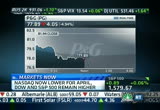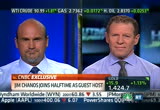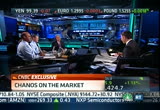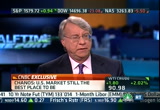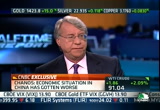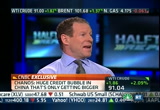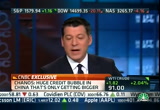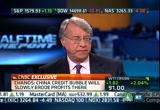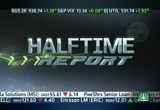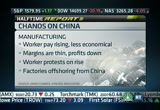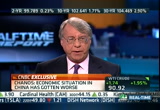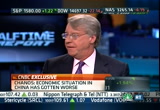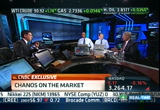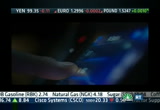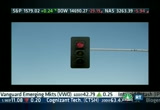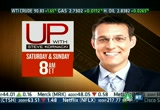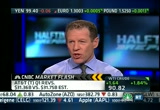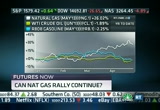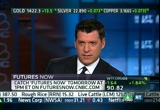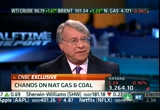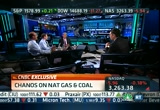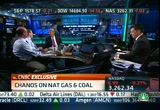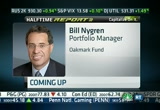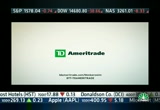tv Fast Money Halftime Report CNBC April 24, 2013 12:00pm-1:00pm EDT
12:00 pm
to be under pressure. the only segment in which organic sales were down for the quarter, despite some new products like vidal sassoon pro, and cover girl mass kara. that does it for us here on "squawk on the street." let's get back to headquarters. wapner on the halftime. >> all right, carl, thanks so much. welcome to a special edition of the halftime show. today we are joined for the full hour by jim chanos, called one the world's greatest short sellers for his calls on enron and recently on hewlett-packard and hours. over the next hour, we'll talk about key positions, bearish take on china and the role short sellers play in the markets today. jim, welcome. >> good to be here. >> pete najarian joining us for the hour, as well. let me get your take just where we sort are in the markets at large. does a guy like you -- i mean, you're known as a short seller and we've had this huge updraft in the market. how do you compete with that?
12:01 pm
>> yeah, i've noticed that, scott. look, we are -- we have two pools of capital. our short-only capital, which is predominant part of our business and then a hedge fund, more traditional, like a lot of other managers. we try not to worry about the markets. we're trying to fix stocks that are going to underperform the markets. and, in fact, that's how we get paid. my call on markets is probably pretty worthless. i started my short fund in 1985, the dow was at 1300. so timing is not my forte. but look, we're mindful of it. i think the u.s. has probably been the best place to be, probably still the best place to be. if you had to pin me down. i'm a little bit more negative on a couple other places in the world. >> yeah, i've heard about one of those. well-known and documented negative on china, which i want to get to in a second. let me ask a question along those lines. is it harder to be short? is your job more difficult when the tide is going in seemingly
12:02 pm
one direction? >> well, it's not hard to get uptick, scott. when the market is going up -- look, it's -- it's problematic, because it's more frustrating. but on the other hand, you're just given opportunities that i think in all -- when the tide lifts all boats, it lifts even the leaky boats for a little bit. but ultimately, usually the fundamentals roll out and when the market begins to discriminate a little bit, that's when generally the shorts begin to behave better. >> we mentioned china. you just gave a presentation a week or so ago. reiterating, really, how negative that you are. and you've been for several years. so nothing has changed in your mind on your opinion what's happening there. >> i actually think it's gotten worse. what's happened more recently after the new party leaders took in, was another burst of investment. but more importantly, another burst of credit expansion. and what really has us concerned now, you have credit actually accelerating in china.
12:03 pm
but gdp growth still slowing. in the last quarter, china pronounceded some staggering numbers a couple weeks ago. new credit outstanding jumped by $1 trillion u.s. now this is an $8 trillion u.s. economy. so on an annualized rate, that's 50% gdp. new credit creation. and to put that also in perspective, total new credit globally went up by $1.5 trillion in the first quarter. china is $1 trillion of that, yet only 10% of the world economy. so there is a credit bubble that's actually not only huge, but getting bigger. >> how do you trade? what do you look for? what are your positions to take advantage of that? >> well, one of the things we have talked about historically is being short booms that go bust. and i've always defined that very strictly in that you look for asset inflation where the asset being inflated by credit does not serve -- does not generate cash to service the
12:04 pm
debt. so you get the so-called ponzi finance moment. and that would be almost anything related to real estate or construction in china. so property companies, cement companies, steel. and then, of course, companies selling into that, that bubble. iron ore and mining. that sort of thing. so inexorably, you can't keep growing your credit at 50% of gdp. something is going to give. when, i don't know. but it has been a pretty good place to be short as we were talking about before the show. >> yeah. and don't you think that it's a little misguided to assume that the chinese government is so magnanimous and so generous they're going to come in and bail out all the citizens, all the bankers, all the corporations, the shadow financing. because even if you just look at the report numbers, which can't believe anyway, under any circumstance, you've got the whole shadow financing situation. >> right. well, they're not going to bail you and pete out, that's for sure. >> right. >> i mean --
12:05 pm
>> pete doesn't need baling out. >> you never know. >> that's true. but i think that one of the things we keep pointing out to people, to just understand what you're dealing with. the sort of state-directed capitalist model that everyone is enamored with. keep in mind, the chinese economy has gone up four-fold in the last years, and the stock market has gone nowhere. i dare say if the u.s. economy quadrupled it's growth in ten years, we would have a pretty good stock market. and the fact that they haven't tells you that, you know, the insiders, the party members, are taking their cut. and you are last in line. and i think that that -- that may still generate growth for the country and for the economy. but certainly not fort capitalists providing the capital. >> when does it fall apart, if at all? because there are others who are on the other side of you. >> yeah. >> say that, no, it's just wrong. it's not as bad as jim chanos and some of the other negative voices on china are seeing it.
12:06 pm
>> yeah, i think people are kind of expecting smoking ruins to appear, you know, imminently. and that's just not going to happen. it's a credit bubble. and so what is happening is that you're seeing just slow erosion in share prices and profitability. last year, economic growth was just about 8% in china. profits collapsed. and that's using their accounting. so with 8% growth. so it is happening, scott. i mean, this has been -- if you look over the last three years, i mean, despite some really hair-raising rallies along the way, investing in china has been really not a very good place to be. >> you negative the kind of companies that big multinationals that have big exposure into china, as well? >> well, we're -- you could basically surmise we would be short anyone who is wholly dependent on the chinese construction boom. so, again, you know, the sort of obvious character is iron ore. we have been public on a few of those names and things like that. but also in china, keep in mind,
12:07 pm
the chinese are still building capacity internally in places they don't need more capacity. you know, steve has talked about some of this in the past. >> steel. >> steel and cement, yeah. >> steel, they keep building and is building. and what's interesting it is that last year one of their top five initiatives was that the government was to cut back steel production. instead they have grown steel production. >> how many times have we debated on this very desk, companies like valay, one that frequently comes up. >> and we have been public, we talked about that in the fall. and valay is highly dependent upon the chinese market. and has a different business model than it did in the past. and that's one of the problems with the minors fundamentally, scott, the model change. in the old days, the governments would work with the mining companies to help them get their product to market. they would help them build railroads and ports and this sort of thing so that these big companies could sell into the
12:08 pm
global market. now governments have gotten smarter. and are actually requiring the companies to build this infrastructure themselves. so the capital employed in this industry has gone up dramatically. >> i read something yesterday and i don't remember who said it, but perhaps an analyst, who made a statement of the recovery there in manufacturing being painfully slow. right? the expectation is just that endless stimulus is going to come to keep gdp to the level the chinese want. you make an interesting statement as well that gdp drives economic growth in china, not vice versa. >> yeah, we call it the gdp tail wags the economic dog. and i think that is important, because of the obsession with gdp and not missing targets, and also keep in mind that the party cadres at the local level and at the regional level are all judged and promoted on gdp. really means it's sort of back to the old dot com takes ten years ago when you had to beat numbers by a penny.
12:09 pm
that was important. and how you did it became sort of secondary and for many companies very telling. on a negative basis. the whole country is structured that way in china. >> jim, if we could circle back to valet for one secretary, to get inside the mind of a gentleman like you shorting and it hasn't bust yet over in china. it's gone down, as you said, but we haven't seen it completely implode. do you continually accelerate your short positions in a name lake valay because valay is so exposed over there you were short last fall, shorter again in december. >> it's been a good -- >> but are you continuing, in other words -- if you see this thing coming and it hasn't bust yet, are you continuing to sell into this? is . >> one of the things that is important to understand about an institutional short seller as optd to individual or trader, in our global fund, we have 100 positions. so, you know, any position -- in and of itself is not huge. so one of the things we're doing, pete, is always
12:10 pm
constantly reevaluating daily. where we're allocating capital. and if a stock or group has gone down, maybe just because of sentiment or whatever, we might actually cover a little bit and add positions like iron ore if they have gone up or the pc sector, i think, whatever -- you know, that have rallied and we're constantly redeploying capital and that's part of the game. and i think there is a tendency, and scott and i have talked about this. there is a tendency to discreetly look at short positions but on the long side more on a portfolio process. people tend to on a behavioral basis look at the short side differently. and i think that that can be a mistake. because for us, it's part of a large portfolio that's institutional. and, you know, we're always going to have 100 names, 10 or 20 driving us crazy. 10 or 20 probably working. and, you know, 60 to 80 monkeying around with the market and i think that allocating capital is much my job as staying on top of the names. >> i think what's interesting
12:11 pm
that people may not realize as well, for every name like a valay that you may have short, there's a name on the other side that you would be long. >> in our hedge fund. >> yeah, in the hedge fund. i would be looking at a recent 13f, for example. you're long deere, at least you were the last filing. so looking at both sides of this. this isn't a situation where jim chanos is only short every name he has ever mentioned. >> and it also underscores a concern i would raise for your viewers, when it comes to hedge fund investors, be very, very careful about following them into trades based on their disclosures, because you don't necessarily see the other side of the trade. and that is -- you may not see the short position against that. so the hedge fund manager may not have a view on an industry by being in deere but in our case, we're short construction machineries elsewhere. >> coming up, apple closely
12:12 pm
12:14 pm
12:15 pm
following earnings report and news it's hiking its dividend and buying back stock. got to ask about apple. >> okay. >> what's your take on what's going on there? what's your position, if any? >> we have a small long position in our hedge fund. we have a position in two companies, samsung and apple. and we have them against -- i think it's fair to say, pretty good sized short positions. >> we're going to talk about. >> and that has not -- that was a great trade until the fall of last year. it's been a pretty bad trade so far in the fall, spring of this year. but i don't think really fundamentals are changing a lot. i think apple has got its own issues. but, boy, oh, boy, the pc business is falling apart fast. >> you never shorted apple. >> no. >> at 700 bucks or around there. >> no, no. >> were you ever tempted? >> no. >> why not? >> again, we don't short things on valuation, scott. and we did not see the erosion in their business. certainly not at 700.
12:16 pm
but on the other hand, our longs are really, again, offsetting our short positions. and seeing what we're seeing in the hardware business, in the pc area, we really felt we wanted to be -- have some long exposure in mobile and tablet. and the best two places to be, we thought in mobile and tablet was apple and samsung. >> here's what a lot of, you know, particularly retail investors or some hedge funds don't realize when shorting the stock. there may be a particular thesis in a company you don't like, whether it's the accounting, the exposure to a particular commodity. and what jim does so artfully and what he limits his risk, he takes everything out of the equation. so he's taking mobile out of the equati equation, just focused on the pc by being long something on the other side. >> and there is actually an additional thing and that is accounting. that the companies were short, have a glaring, glaring hole in their economics. they are not spending on r & d. and by the way, one of the
12:17 pm
concerning things about apple, their spending on r & d is not as good as it should be. you look at samsung or ibm, they're spending 6% a year on r & d to put out new products or services. you look at a company like dell, or hewlett-packard, it's 2 to 3%. and that difference on a low margin business makes them marginally much more profitable. the difference is, dell and hewlett-packard are acquiring r & d, capitalized. in their case, not doing a good job with it, buying bad companies. >> don't they have issues, or isn't there a flag in terms of what they're doing with their inventory? >> well, there are some other issues. dell -- if you look at dell finance, which people thought was a jewel, it's mostly subprime customers. people don't realize this. dell is financing the most marginal buyer pcs. and there's lots of other accounting issues. we know dell was cited in the past by the s.e.c. as a major
12:18 pm
accounting fraud. but i think that the real structural issues here are these companies are behind the 8-ball. pc sales, which were really flat last year and laptop sales, have now finally begun their decline so. so a difficult situation a year ago with more competitors with acer, is exacerbated by the market itself rolling over. >> let's hang on that for a second and bring in tony, highly rated analyst, joining us on the phone now. tony just cut his price target on apple, on the back of the earnings news, and all the other news coming out. and tony, good to have you back, i want to talk about apple and then dell. which i know you cover, as well. but sort of give us your wrap-up on what happened with apple and where you think the stock goes from here. >> sure. so i think two things on apple. on the positive side, they did a very significant return of cash to shareholders at the very high
12:19 pm
end, i think of where investors were hoping. and all else being equal, that was a positive. on the flip side, there was evidence of gross margin pressure in the quarter. they were down sequentially, and the company guided for gross margins to go down again sequentially next quarter. and this is worrisome, because apple is at the part of its product cycles where it's introduced new products where typically gross margins should be improving. so to see margins down, even adjusting for mixed effects, we believe iphone margins were down in the quarter, is worrisome. and it points to, you know, a mix shift to lower models within apple's lineup, which generally have lower margins. and, you know, ultimately, micros margins numbers came down and my estimates came down and my price target came down commensurately. >> but your rating remains outperform, right? you're still telling people you think it's a buy.
12:20 pm
is that solely because of the financial moves that they made around the buyback and the dividend? because it sounds like you're still pretty negative on the underlying story here. >> the principle reason we have a buy is -- goes to the core of the debate on apple. i think we could at any time at the right price $400 a share or $350 or $500. but i think as an investment, the bet on apple is, do you believe that innovation still exists at the company, and that they can create new markets for themselves. either significant product line extensions like a low-priced iphone or new categories, whether it be a watch, a television or converged device. if you believin' no vacation is alive and well at apple, then numbers are likely to go up. the stock is inexpensively valued and sentiment is likely to become more favorable on the stock. if you don't believe in that premise, we could debate the valuation is probably worth somewhere between 350 and $500. but i believe the former. and that's the basis for
12:21 pm
outperforming. >> let's move the conversation ahead to dell, and hp. jim chanos, as i know you have probably heard, is still with us. let's just get right to it. you're still short? hp? and dell? >> we are short both dell and hp. >> how have you navigated what the stocks have done? because hp has been one of the better performers. >> it's been great. and we got out of dell last fall when it got to $10. >> okay, thanks very much. >> but hewlett on the autonomy news was at that point a reasonably small position. covered a little bit but then watched it basically double on us. but we have been adding these prices right in here. and i think that that really the story, hewlett jumped on their first quarter earnings. but secular story has not gone away. it is facing tremendous, tremendous headwinds in pretty much all of their businesses.
12:22 pm
printing, ink jets, lex smart put out some horrible numbers the other day. pcs, as we know, servers, and servers, as i've told you, are pcs. everyone forgets that. they're pcs in a wreck. and you have companies like amazon now building their own servers. they were buying from hewlett and dell before. they're building their own white box servers. >> they're going to own the cloud of the. >> so the point is, the hardware guys increasingly in that space are going to be facing really, really tough, tough headwinds. >> it's been an interesting trade, obviously, to try and navigate. you've had to be nimble, as you said. >> and michael dell is trying to buy dell. >> how do you think that's going to unfold? >> i have stayed short, i have shorted into the deal. i could not believe that blackstone and others saw value here. i still don't see what dell -- michael dell sees at silver lake. i'm completely scratching my head. and, you know, we'll see. >> isn't that a great short,
12:23 pm
almost the perfect short? because you've got a takeover at the table, not going higher. and if they step away -- >> people thought the thing was 22 on a stub basis and, you know -- i can't make the numbers work. and the cash flow is plummeting. real challenges here. and what i really don't understand is the commercial banks who are lining up to finance this deal. because these are companies, if they go away -- remember deck, the compaq bought and dell bought them. these are companies where you could see the corpus of the business go away. and the tangible equity at dell, last i checked, i think is a negative number. so there is no tangible asset. the cash is offshore. it has not been taxed. and the cash supports the current liabilities. so there's not net cash at this business. and net of tax liabilities, there is negative working capital. so i'm puzzled. as a financial analyst and a business analyst, i'm puzzled why this is an attractive deal. >> tony, are you still there? >> i am still here. >> what do you have to say to
12:24 pm
that? >> look, i think -- i believe in jim's characterization of the pc business that, you know, there is significant secular headwinds. you know, the near term bet on dell is does michael dell have the resolve to carry forth the deal or not. and if he doesn't, you know, the stock was trading at $9 prior to the deal being put on the table. the financials are significantly worse than they were before. so you -- i think you would have significant near-term down side. the stock seems to be just argument matcally, basically saying we think there is a 90% chance the deal goes through and that's why it's trading slightly below the offer from michael dell and silver lake. and a 10% chance it might go to $9 or less. but i think that's the dynamic. on hewlett, look, i think there are real challenges in the business. and we are recommending the stock, and have been for the
12:25 pm
last little while. i think it's really predicated on what you think the right value for a company where revenues are likely to decline going forward, but if you deploy capital properly, like ibm has done very successfully over the last ten years, on very little to know revenue growth, you can actually still create economic value. and the question for me is, what's that right price for hewlett. the pc exposure is significant in revenue terms, 30% of revenues, but it's only about 10% of profit. so while that will be a significant headwind going forward, we don't think it ultimately undermines the entire company. >> tony, good to have you. thanks for joining the conversation. let me ask you. there's -- if you look at the hp and dell scenarios, it's natural to sit back and say what about intel, what about microsoft? disk drive makers? all of the companies relying
12:26 pm
heavily on pcs. >> yes. >> why not those? >> well, i'm not saying why not those. i think that your viewers should be, you know, sharpening their pencils when in this space. because clearly now the surprises are going to be on the negative side going forward. >> coming up, big names in the dow making hefty moves today. we'll reveal the stocks and tell you how to trade them. plus, chanos' largest long position up 22% this year. head to the futures pits to see how they're trading and betting on national gas when we come back. [ female announcer ] what if the next big thing, isn't a thing at all?
12:28 pm
it's lots of things. all waking up. ♪ becoming part of the global phenomenon we call the internet of everything. ♪ trees will talk to networks will talk to scientists about climate change. cars will talk to road sensors will talk to stoplights about traffic efficiency. the ambulance will talk to patient records will talk to doctors about saving lives. it's going to be amazing. and exciting. and maybe, most remarkably, not that far away. the next big thing? we're going to wake the world up. ♪ and watch, with eyes wide, as it gets to work. ♪ cisco. tomorrow starts here.
12:29 pm
welcome back to the halftime show. a market flash now from josh lipton and some of the days biggest movers. >> tracking three stocks. one in the green, two in the red. let's start with boeing, first quarter earnings have beefed the street. more important, the outlook. firm sales earnings and cash guidance for the full year. as for what is not working today, at&t getting hit hard, reporting a larger than expected
12:30 pm
revenue drop. also check out procter & gamble, organic sales growth and fourth quarter earnings guidance, disappointing investors. scott. >> thanks so much. weise, at&t? >> i own it, not as much as i used to. i own it because of the whole growth, and they just had some missteps in wireless. but stock is down 5.5% today, 6% today. the yield is 4.6%. so there goes your whole yield, okay, in one day that you had a hold on for a year. sometimes yield is not a support. you've got to buy the fundamental. >> so the read on boeing and p and g. >> i think the p and g story, got to a level where if they missed stepped at all -- >> a problem with a lot of the staple -- >> a lot of the staple names gotten themselves to a valuation level where people have piled into, and you wonder at what do they have too much exposure. and when they have the misstep you see it selling. the boeing news is the most
12:31 pm
shocking likely because of the rapid move to the upside. we have seen some of the bounce and the continuation of a bounce after the selloff, after the battery issues, very impressive. >> let's talk about nat gas for a moment, down today, but continuing to hover, up 25%. let's go to jackie de angeles and the futures crew. >> very true. but even more impressive, i think, that nat gas has soared even as oil and gasoline have been crushed. so how long can the rally last. that's the question. let's start talking futures now. anthony grizz anti, what's behind this, and has the rally surprised you. >> definitely surprised me. my hat is off to my partner jim in chicago, he saw this two months ago. you have a count that's less than last year at this time, overlanging supply that's completely eliminated at this point. a winter that just won't let go of the market. and for the last four weeks, the supply numbers show less of a supply than we anticipate, making the market more bullish. >> jim, is nat gas do you think
12:32 pm
going to follow crude and gasoline lower at some point? >> no, i don't. i think that they disconnected several years ago when we were pricing in global warming and a huge abundant supply. the tail wind is still behind natural gas, bouncing off a trend line. if you want to know how high, you have to look at how low it went in the last three years. natural gas clearly has room on the up side. >> jim and grizz, back to the pits. back to you. >> thank you so much, see you at the top of the hour on cnbc.com. give us your read on nat gas, how would you play it. >> we are not commodity gurus. we bought nat gas and a couple positions in the nat gas space, completely as a hedge against our shorts. so our view is company-specific in that space. but i wanted to hedge out the commodity, because i have no idea, unlike the guys in the pits do a much better job than i do or people in the field. i have no idea where the commodity is going. >> there are those who sort of look at your style and look at the kind of companies you may be
12:33 pm
interested in. and there's sort of this glaring thing about chesapeake. what does chanos think about what's going on with that company. what can you -- what can you say? >> chesapeake energy. well, i'm not going to comment on chesapeake energy, but i would point out that we often looked at companies to put their name on arenas and sports teams. >> hmmm. i have to check -- i have to check the facade of that building down in oklahoma city. >> oklahoma city. i think -- i think chesapeake is in oklahoma city. look, not to be glib. but i think that you could look at any of the players in the space, the nat gas domestic space, that are leveraged, that were buyers of properties when gas was 6 to $10, they couldn't get enough. and now do their capital structures and ongoing commitments to keep drinking and we talked about this. are being forced to sell properties. and i think that's actually having an impact on the commodity, as well. so you were buyers at 6 to 8,
12:34 pm
sellers at 2 to 4. and the debt isn't going down. that's a really lethal combination. in addition, there are companies like chesapeake and others that have gotten a lot less for their acreage sales than analysts thought. and part of the reason for that, and, again, you know this, is that a lot of these sales have commitments on them to keep drilling. to keep the leases. and often in the sale, the seller keeps that liability. and i think that's a thing a lot of people have missed in chesapeake and some of the others. anybody having negative cash flow at $4-plus for mcf is going to be very, very problematic. >> i mean, look, part of what you do is consider yourself a financial detective, as well, right? that's what short sellers sort of how they make their names at times. you look for issues that arise on boards, and other things that go on that certain stocks could be -- have -- could have been within question. right?
12:35 pm
i mean -- >> well, there's a lot of asymmetries said in the past about the short side. and one of the reasons, actually, i wanted to come on the show and talk to you about this, a lot of misconceptions out there about the short side, bull markets. and by the way, short sellers, it's a bipolar world if you're on my side of the street. you're either dr. evil or you're the village he had idiot. never middle ground. bringing down western civilization or a simple target at the carnival show to be plunked into the water. so i think that -- i think the reality might be somewhere in between. but one of the real asymmetries, there is an important market function that short sellers sometimes provide, and that isn't ferreting out fraud and corporate governance and wrongdoing. i often said if bernie madoff would have been a public company, the shorts would have been on to him a long time ago.
12:36 pm
and i believe that. and that is a function short selling does provide for the marketplace because they are incentivized to look for companies that are playing games. >> look, we're going to talk much more about that after the break. in fact, we're going to go to trade school. it's the art of short selling, and our guest host is the professor. when we come back, jim chanos will tell us how he sniffed out the fraud at enron and what makes a good short. plus, portfolio manager bill nygren joins the halftime show to show how he puts his $12 billion in management to work when we come back. ♪
12:37 pm
12:39 pm
12:40 pm
good to see you again. >> thanks for having me. >> how does a guy like you feel about apple today? >> not very different than we did yesterday. i think the earnings numbers and guidance were a little bit disappointing. but to us that was at least offset by the really positive step that management was taking to commit to return the excess capital the company is building to the shareholders through a purchase and dividend. you're looking at apple today with a dividend yield over 3%, a large share repurchase in progress. and cash on the balance sheet that if you adjust the price for that, the stock selling at about six times earnings. i don't think anybody thinks apple deserves to sell at six times earnings. bears argue the earnings are vulnerable. people that own it, like us, are of the belief that we're in a couple quarter lull while we're waiting for more new products. >> sounds like a guy who may have added to his position after the news came out. did you do that? >> we did add to the position
12:41 pm
last quarter. i can't discuss what we have done this quarter. >> understood. what's your best play right now, best value pick? >> another stock we added substantially do last quarter was directv. this is a stock that sells at about nine times expected earnings. and what we really like about directv is the disciplined return of capital to shareholders. ten years ago, this company started an aggressive share repurchase plan, and they have repurchased 60% or more of their outstanding shares since then. so if you own directv ten years ago and you own the same number of shares today, you own 2.5 times as much of the company as you did then. this company is still growing. about 8% projected revenue and earnings growth this year. but when you translate that to a per share basis because of the declining share base, about a 20% grower. and because it doesn't pay a dividend, the return of capital hasn't attracted the yield-hungry investors coming
12:42 pm
from the bond market. >> you like forest labs, as well. but i also know, bill, you no longer own dell, is that right? >> that is correct. >> why did you -- why did you get out of the stock? >> we considered -- of the third parties that were potentially involved here, we considered blackstone to be the most information-advantaged player. and after they did their due diligence on information that we as public investors don't have access to, when they decided to walk away from their higher bid, it made us feel the probability of a bid higher than the michael dell/silver lake bid was diminished substantially. and we like a lot of other stocks. we think there are a lot of stocks to choose from that are significantly more undervalued than dell is. >> understand. bill, thanks for coming on again. appreciate it very much. >> thank you. >> all right, bill nygren. part of jim chanos' appearance today is hopefully help you better understand the
12:43 pm
ins and outs of shourd selling. jim is best known for the early detection of the enron fraud, probably a good place to start. what do you look for when looking for a good short? >> there is never any one thing. ideally, a number of things line up to make a good short. remember, you're bucking the trend overall of markets generally going up over time. so you have to understand that. so you really need to have an edge. you need to be able to find something that the street is not focused on. in enron's case, it was certainly accounting that got us going. and where we can find a difference between the economics of a business and the reported profits, we're interested. and in the case of enron, there was a report in fall of 2000 by a reporter at the texas wall street journal named john weil and pointed out that enron had just gotten s.e.c. approval to basically front-load their profits on their long-term derivative trades. and they could assume the profitability over time, and take the profit all in at once.
12:44 pm
as opposed to adjusting it ratably over the life of the derivative. we had been involved in a number of shorts in the past that had done that. and i know you'll be shocked to hear, but almost always management's estimates were too high. as we opened the 10k and 10qs and looked at t things started jumping out at us. a lot of what happened at enron was hiding in plain sight. the deals with the odd affiliates, where andy fast know, cfo was general partner of the affiliate and cfo of enron and doing trades with each other. and a number of things. enron in particular probably had all of the attributes you wanted to see, leveraged, bad accounting, corporate governance, and finally, one of the things your viewers can focus in on, two simple indicators. may not make it a good short, but probably means you should be exiting on the long side. wholesale executive departures
12:45 pm
and large amounts of insider stock sales. not just single people but everybody selling their stock. those two indicators together are about as big a red flag as you can get without going into the kind of work that we do. >> you've made the point already, really, that you think short sellers get a bad rap. you do. >> most of the time. most of the time it's undeserved. every once in a while, there are bad apples on all sides of the street, unfortunately. but i think generally speaking, the short side gets a bad rap. >> what -- do you pay attention to short interest? what are some of the key things you look for, but besides the stuff you have to dig and find? >> yeah. we don't spend as much time, i think, as a lot of people would think we would do or some traders do. one point on the short interest i'll make, and i hear it sometimes on this show, not from you two gentlemen, of course. >> of course. >> but that's misleading. and i want to basically talk about it for a few seconds to make a couple points. number one, when people talk about the shorts having to cover
12:46 pm
ultimately being a source of artificial demand for a stock, right? you have to close out your position. what everybody forgets is that all stock trading is a zero sum game. and that for every short position that's created when i borrow a share from you and sell it to you, an additional and equal long position is created. now, the net shares outstanding always have to balance. because the votes have to balance. when you end your shares, you end your vote. but, for example, if there is 100 shares outside outstanding, i borrow from steve, sell them to pete. there's now 110 shares long. so for every share short, there is also an additional long. a lot of people forget that. number two, there's no time frame on a short. generally speaking. unless there is a borrow issue, you can keep a position outstanding for years. and unfortunately, i've had to do that sometimes. >> right. but that speaks to the risk, right? there are inherent risks involved in what you try and do every day.
12:47 pm
>> absolutely. and i think that's one of the reasons why people think a little bit too discreetly about short positions, which we talked about earlier in the show. because back in the mind of everybody, including me, is the fact that a stock can go up inif i knitly and can only go to zero. although, as i pointed out, i've seen a lot more stocks go to zero than infinity. but, in fact, you mitigate that by portfolio management. you know? you don't want to have just one or two shorts if you're a portfolio manager. you have a portfolio and you're constantly reallocating capital depending on risk and set limits. >> but you're also -- you've got much more patience because of the type of work you do than normal short, particularly for retail. and you've got the staying power. shorts when you're wrong become bigger. >> yeah. >> they become a bigger position. so the risk is increased. so you've got a patient group of investors and you do the work. so that gives you the opportunity to stay short and go through the supposed squeezes. >> i've said, steve, i don't think shorting is for every
12:48 pm
trader/investor. people who have issues on risk. i think that if they're worried about the market rather than short stocks, they should sell down their as long as to a sleep at night level. you also keep in mind, it's not a tax advantage unless you're a tax-exempt institution, which most of our clients are. >> gotcha. >> another big difference. >> all right. coming up, you saw it right here on the halftime show. ackman and icon going head-to-head over their positions on herbalife. >> i appreciate, bill, that you called me a great investor. i thank you for that. unfortunately, i can't say the same for you. >> this is not an honest guy and this is not a guy who keeps his word and this is a guy who takes advantage of little people. >> talk a little icon, talk a little herbalife. we're going to ask jim to weigh in, as well. we're back in two minutes. [ beeping ] ♪ [ male announcer ] we don't just certify our pre-owned vehicles. we inspect, analyze and recondition each one,
12:49 pm
until it's nothing short of a genuine certified pre-owned... mercedes-benz for the next new owner. ♪ hurry in to your authorized mercedes-benz dealer for 1.99% financing during our certified pre-owned sales event through april 30th. [ agent smith ] i've found software that intrigues me. it appears it's an agent of good. ge has wired their medical hardware with innovative software to be in many places at the same time. using data to connect patients to software, to nurses to the right people and machines. ♪ helping hospitals treat people even better, while dramatically reducing waiting time. now a waiting room is just a room.
12:50 pm
12:51 pm
and go. you can even take a full-size or above, and still pay the mid-size price. this is awesome. [ male announcer ] yes, it is, business pro. yes, it is. go national. go like a pro. . >> crime and punishment. that fake ap tweet rocking the markets. the next steps in the investigation and how easy it is to get hacked. what you can do to protect yourself. >> tim cook making a 100 billion dollars move to get wall street and investors off his back and in love with apple stock again. but should he care what wall street thinks? and government spending cuts hitting juniper network's stocks.
12:52 pm
to look for the best possible price -- maybe even better than you expected. it's all part of our goal to execute your trade in one second. i'm derrick chan of fidelity investments. our one-second trade execution is one more innovative reason serious investors are choosing fidelity. now get 200 free trades when you open an account.
12:54 pm
>> carl icon and bill stating their sides on herbalife. the interview did get quite heated. you were short. you are no longer involved in. how do you think that whole thing is going to play out? >> you don't have bill or carla on the phone do you? >> i can get them on the phone. i don't want to walk into that. >> we do have whitman and michael dell.
12:55 pm
>> never go to a fight you're invited to. is this a viable mlm. is the product really selling through? and herb green and others have covered this. or are you selling it to your distributors? i think that the jury is out on herbalife. at 55 to $60, i thought that you had a pretty good free put on stock.
12:56 pm
12:57 pm
12:58 pm
it doesn't just see the future. it is the future. iat bny mellon, our business e. is investments. managing them, moving them, making them work. we oversee 20% of the world's financial assets. and that gives us scale and insight no one else has. investment management combined with investment servicing. bringing the power of investments to people's lives. invested in the world. bny mellon. revolutionizing an industry can be a tough act to follow,
12:59 pm
but at xerox we've embraced a new role. working behind the scenes to provide companies with services... like helping hr departments manage benefits and pensions for over 11 million employees. reducing document costs by up to 30%... and processing $421 billion dollars in accounts payables each year. helping thousands of companies simplify how work gets done.
59 Views
IN COLLECTIONS
CNBC Television Archive
Television Archive  Television Archive News Search Service
Television Archive News Search Service 
Uploaded by TV Archive on

 Live Music Archive
Live Music Archive Librivox Free Audio
Librivox Free Audio Metropolitan Museum
Metropolitan Museum Cleveland Museum of Art
Cleveland Museum of Art Internet Arcade
Internet Arcade Console Living Room
Console Living Room Books to Borrow
Books to Borrow Open Library
Open Library TV News
TV News Understanding 9/11
Understanding 9/11